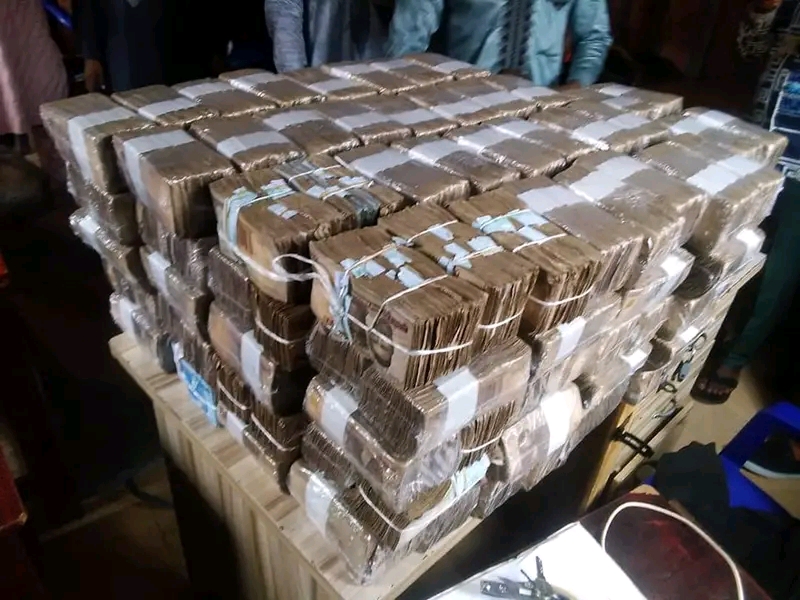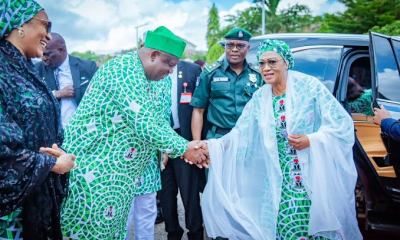Headline
FG disburses N1.6trn to states, FCT for infrastructure project

In a significant push to boost development and tackle insecurity, the Federal Government disbursed a total of ₦1.6 trillion to state governments and the Federal Capital Territory (FCT) between March 2024 and May 2025.
According to official records from the Office of the Accountant-General of the Federation (OAGF), the funds were provided as financial support to enhance infrastructure projects and security operations at the subnational level.
The 15-month disbursement, highlighted in documents submitted at the May 2025 meeting of the Federal Accounts Allocation Committee (FAAC), underscores the government’s commitment to addressing critical infrastructure gaps and widespread insecurity across Nigeria.
During the meeting, the committee distributed a total of N1.659tn to the Federal Government, state governments, and local councils, a decrease of N22bn compared to the N1.681tn shared in April.
The disbursements were made under a special intervention programme funded through non-oil revenue savings, as part of efforts to ease fiscal pressure on subnational governments and accelerate project execution at the grassroots.
The document, titled “Ledger of Savings on Intervention to States Infrastructure and Security,” showed that the payments were drawn from non-oil revenue savings, totalling N1.7tn within the 15 months.
However, the document did not disclose how much each state received or whether the funds were disbursed separately from the monthly revenue allocation.
Details of the transactions indicated that the total receipts by the Federal Government over the period stood at N1.7tn, from which N1.6tn was paid out to state governments and the Federal Capital Territory, leaving a balance of N100bn as of 16 May 2025.
Each payment is recorded as a “Payment for Intervention to States and FCT”, while corresponding inflows are titled “Transfer from Non-Oil Savings.”
The cumulative breakdown shows that 21 separate payments were made during the period, amounting to N1.6tn, with a remaining balance of N100bn in the account as at 15 May 2025.
The first tranche of N200bn was transferred on 20 March 2024, covering January and February 2024. From then on, disbursements of N100bn or more were made almost every month. A peak payment of N222bn was recorded in May 2024.
Recall that on July 20, 2023, President Bola Tinubu approved the establishment of the Infrastructure Support Fund for the 36 states of the federation as part of measures to cushion the effects of the petrol subsidy removal on the people.
Shedding more light on the establishment of the ISF for the 36 states, the then Special Adviser to the President, Special Duties, Communications and Strategy, Dele Alake, said, in a statement, “The new infrastructure fund will enable the states to intervene and invest in the critical areas of transportation, including farm to market road improvements; agriculture, encompassing livestock and ranching solutions; health, with a focus on basic healthcare; education, especially basic education; power and water resources, that will improve economic competitiveness, create jobs and deliver economic prosperity for Nigerians.
“The committee also resolved to save a portion of the monthly distributable proceeds to minimise the impact of the increased revenues, occasioned by the subsidy removal and exchange rate unification, on money supply, as well as inflation and the exchange rate.”
He added, “These savings will complement the efforts of the ISF and other existing and planned fiscal measures, all aimed at ensuring that the subsidy removal translates into tangible improvements in the lives and living standards of Nigerians.”
A breakdown of the transactions reveals that the monthly receipts and payments followed a consistent pattern, with a few spikes indicating exceptional disbursements. In March 2024, the FG received N300bn in non-oil savings and paid out N100bn to states. In April 2024, N100bn was received and N100bn was disbursed.
In May 2024, there was no recorded receipt, but the FG paid N222bn, the highest single disbursement in the 13 months, to the sub-nationals. In June 2024, N100bn was received and N100bn was paid.
In July 2024, another N100bn was received, and N100bn was disbursed. In August 2024, N100bn came in, and N100bn went out. In September 2024, the FG received N100bn and paid N100bn to the states. In October 2024, N100bn was received, followed by a N100bn disbursement.
In November 2024, N100bn was received and N100bn was paid out. In December 2024, no data was recorded, suggesting either a pause or a delayed transaction. In January 2025, no receipt or payment was recorded in the ledger.
In February 2025, N200bn was paid to states without a corresponding recorded saving receipt, indicating it may have drawn from previous balances. In April 2025, N100bn was received, and N100bn was disbursed.
In May 2025, no new receipt was recorded, but N100bn was paid out, likely for April obligations. By May 2025, the Federal Government had disbursed N1.6tn out of the N1.7tn saved, leaving a balance of N100bn in the intervention account.
The regular monthly payments, typically N100bn, reflect a structured intervention strategy by the FG to provide fiscal support to subnational governments.
The payments, made monthly under the Federation Account framework, are aimed at supporting subnational governments to address pressing infrastructure gaps and security-related challenges. However, questions remain over how the funds are being utilised by states, especially given rising public concern about transparency in state-level spending.
The Executive Director of the Civil Society Legislative Advocacy Centre, Auwal Rafsanjani, criticised the Federal Government and state governors over what he described as the poor and unaccountable use of the N1.6tn disbursed for infrastructure and security between March 2024 and May 2025.
Rafsanjani, speaking in an interview with The PUNCH, said the funds, which were meant to address critical developmental challenges across the country, have not achieved their objective, considering the level of insecurity in the country.
He noted that with political actors already preoccupied with the 2027 elections, public spending has become more about power retention than people-oriented development.
He said, “First and foremost, we are in the era of financial recklessness. We are in the era of collapse of responsible governance, accountability, and a collapse in poor projects and programmes that would impact the Nigerian people. So we are not surprised to see this level of lack of poor utilisation of this saving to ameliorate the suffering of Nigerians in terms of infrastructure, insecurity, healthcare, education, and basic amenities that are needed for the society or for the people to be productive and protected in Nigeria.
“Instead, we are seeing democratic scrambling of public resources without accountability for personal use. This is what we are experiencing, and unfortunately, this is what public officials and political officials are doing in the country. Right now, the only preoccupation is 2027, so wherever they can make money to invest in the 2027 election at the expense of development in Nigeria. This is why you can’t have any accountable public spending in Nigeria.”
When asked if the ₦1.6tn intervention fund was judiciously spent, Rafsanjani responded bluntly, saying it was not.
“No, this can’t be judiciously spent, because if it were, we would have seen the positive impact on the nation. But because it is not judiciously spent, that’s why you can’t see any manifestation of benefits to the Nigerian people.
“The whole idea was probably not to allow the public to know these things, where questions would be asked. We need to make a serious issue, it would continue, and this is happening at all levels.”





















